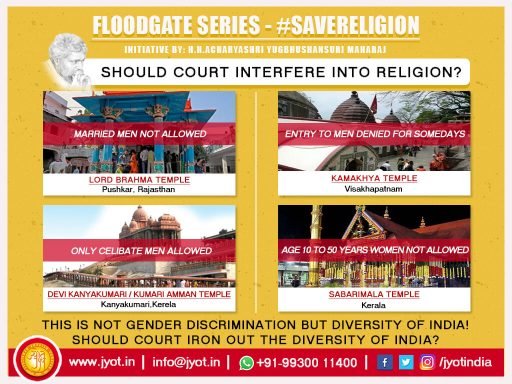Every Country commands its position on world stage based on power it possess.
Power is often described in two ways, soft power and hard power, hard power includes army, economy, etc & soft power includes religions, values, traditions, customs, culture, art, literature, music, design, fashion, and even food.
Though India is ranking sixth in hard power, but has potential to be first in soft power. It is a treasure trove of diversity. It has been originating point of numerous religions denominations & sects, where each element contributes to rich and varied diversity of
India. To harness the potential of soft power the framers of constitution strived to secure and preserve them.
Any rich diversity will include elements which may be distinct and contradictory to each other. Just in case of entering temple to worship, we may find different rules in different temples adding strength to the edifice of diversity. Few examples to quote here are:-
- Kamakhya temple, Visakhapatnam: The temple denies entry to men for some days in every month.
- Lord Brahma Temple, Pushkar: This temple in Rajasthan prohibits married men from entering the sanctum sanctorum to worship the deity
- Devi Kanyakumari / Kumari Amman Temple, Kanyakumari: Here only sanyasis (celibate men) are allowed till the gate of the temple, while married men are prohibited from entering the premises.
- Sabarimala Temple Kerela: Women of age 10-50 are prohibited to enter the temple to perform the pilgrim. (Ref:https://www.newindianexpress.com/nation/2018/sep/28/indian-temples-
where-men-cant-enter-on-certain-days-1878292.html)
Each of the above example indicates varied rules and regulations to enter a temple. Just observing it superficially it may look like a source of gender discrimination but it is not.
As per oxford dictionary if a gender is subject to unjust or prejudicial treatment then is called discriminated. As enumerated above, in India we will get few examples of temples where only men are allowed and few examples where only women are allowed. This shows such practices are not out of discriminative mindset bearing unjust and prejudicial treatment to a particular gender but are simply rules and regulation based on tenants, tradition, custom etc.
Such variety adds to the edifies of Indian diversity and coloring it as gender discriminative will lead to disrespecting and stigmatizing the constitutes of diversity. Such rules infact adds essence to diversity and fiddling with such diversity will ultimately dent the soft power of India.
THEREFORE AS DONE IN SABRIMALA CASE, SHOULD COURTS INTERFERE INTO RELIGION AND TAG A PRACTICE AS DISCRIMINATIVE AND EXCLUSIONARY WHICH WILL ULTIMATELY DESTROY THE DIVERSITY OF INDIA?
– H. H. Jainacharya Yugbhushan Suriji [Pandit Maharaja]

[vc_row][vc_column][vc_column_text]
You may also like
-
‘Mahavir Jayanti’ is now officially declared as ‘Mahavir Janma Kalyanak’ by Government of Maharashtra
-
Global Watch | Only Christianity has got the global voice, other religions are voiceless, says top Jain monk
-
Sovereignty of religions: If India wants to maximise its global influence, then it must correct historical wrongs
-
Open letter to CJI by Jainacharya Yugbhushansuri
-
DIVERSITY – THE STORE HOUSE OF POWER

